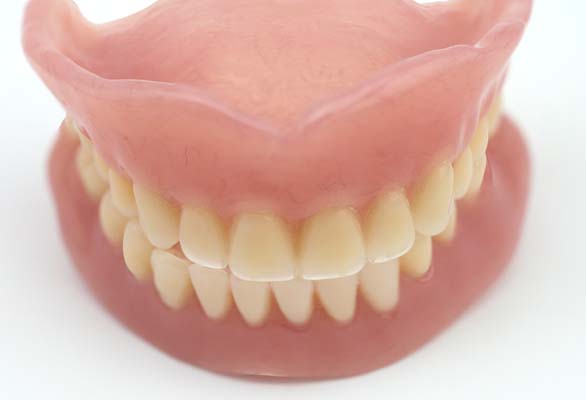Tooth Extraction and Getting Dentures

Considering dentures? Read on to learn more about the process of getting dentures. Tooth extraction is, at times, necessary before getting dentures. However, dentists only recommend tooth extraction before getting dentures when doing so is absolutely necessary.
An overview of when tooth extraction is needed for dentures
This review discusses when tooth extraction is necessary before getting dentures, along with a broader overview of what dentures for tooth replacement are exactly and when a dentist might recommend it for a tooth replacement solution.
The term dentures refer to the set of replacement teeth that the patient wears. There are different types of dentures, including traditional dentures that are supported by an acrylic (gum-colored) base and your natural gums, and implant-retained dentures. Both options are available for replacing a section of missing teeth (partial denture) or an entire row (complete denture).
When dentures are recommended by dentists
During a consultation visit, a dentist will examine the patient’s need for tooth replacement and discuss the patient's goals and preferences for treatment. With this information, they can then explain the pros and cons of each tooth replacement option that is viable, including dentures. Although every patient is different, dentists typically recommend getting dentures when the patient wants a fast solution that does not require an invasive or expensive treatment process.
When tooth extraction is necessary before dentures
Tooth extraction is a part of the dentures process for many patients. There are several reasons tooth extraction may be recommended. First, the patient may need to remove severely damaged teeth that cannot be saved with a dental restoration (e.g., a dental crown).
This could be due to weakened support from the gums and jawbone, severe decay, or another factor. In other instances, a tooth may need removal to make the denture process more convenient. For example, the dentist may recommend tooth extraction for a weakened tooth to allow for full arch replacement rather than partial dentures.
When tooth extraction is not necessary for dentures
There are many occasions when a dentist can complete the dentures process without removing any teeth, especially if the remaining natural teeth are healthy or can be treated with a dental restoration.
What to expect long-term with your new dentures
Once the treatment process is complete, the patient can enjoy their new dentures, which should allow them to function the way they desire. Many patients also report a better self-image, allowing them to pursue the things they love in life more boldly, eat the way they desire, and simply feel better.
FAQs about tooth extraction and dentures
The following are some common questions that dentists receive about replacing a severely damaged tooth (or multiple damaged teeth) with dentures:
How long do dentures last?
Dentures last between five to 10 years in most cases. They may occasionally need to be refitted over the course of their lifespan, as well. Patients can help ensure they get the most out of their dentures long-term by caring for them properly. This should include soaking them daily and rinsing them often, along with keeping the mouth as clean as possible at all times.
What are the pros and cons of dentures?
Dentures are one of the least invasive ways to replace a severely damaged tooth. When compared with a dental implant or a dental bridge, the process is also much quicker and more convenient. However, the durability of dentures is not as long as it is with alternative solutions.
What options are available to help save a damaged tooth?
Most dentists attempt to save a tooth that is damaged before recommending tooth extraction. Of course, there are times when tooth extraction is the best option. As mentioned, dental restorations are the most common way to restore a severely damaged tooth and avoid extraction. The most popular types of restorations are dental crowns, onlays, inlays, and veneers. For oral infections that extend to the tooth’s root or deep tooth decay, a root canal procedure is usually necessary, followed by the placement of a dental crown.
Dentures can help restore the appearance and function of your smile
Here at our dental practice, we believe everyone should be able to show a healthy and complete smile at all times, and it is our goal to completely restore the appearance, function, and health of your smile. To get the treatment process started with a consultation, contact our dental office today.
Request an appointment here: https://www.tanqueverdedental.com or call Oro Valley Family Dentistry at (520) 833-5261 for an appointment in our Tucson office.
Check out what others are saying about our dental services on Yelp: Dentures and Partial Dentures in Tucson, AZ.
Related Posts
Dental patients with multiple missing teeth can benefit from implant supported dentures to restore their smiles and facilitate chewing. This state-of-the-art teeth replacement treatment is also highly effective for improving oral health.This popular teeth replacement option combines the support, stability, and comfort of implants with the affordability of traditional dentures. In addition, patients may benefit…
Screening for oral cancer is an important part of preventative dental care. Unfortunately, oral cancer is a disease that is not often talked about. Very few events support oral cancer research and awareness, even though oral cancer takes one life every day in the United States. Many people do not seek or receive treatment until…
Emergency dentistry is an excellent option if you have a chipped, cracked, or broken tooth. An emergency dentist can help to fix your tooth and prevent further damage. If you have a tooth that is damaged, it is essential to visit an emergency dentist as soon as possible. The sooner you visit an emergency dentist,…
Many things go into good preventative dental care. One of the most important is brushing your teeth, but it's not something that people always do correctly. Today, we will talk about brushing your teeth correctly and why it's so crucial in preventative dental care.First, you need to use an actual toothbrush. There are many options…


